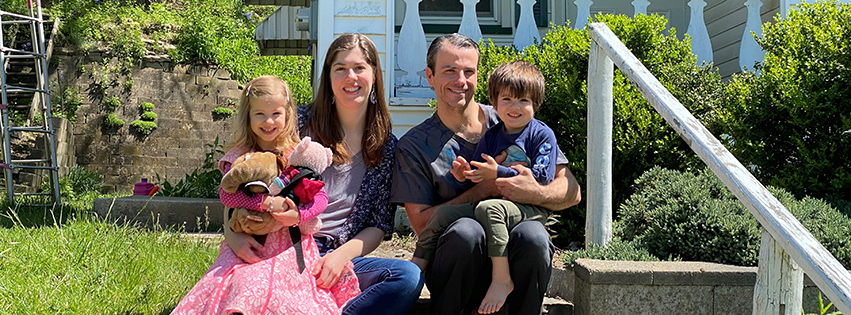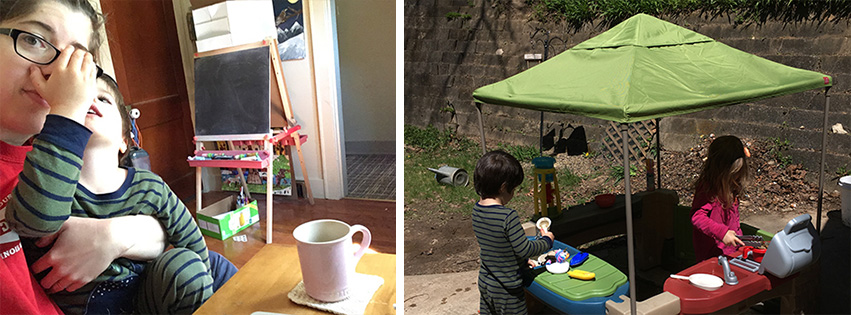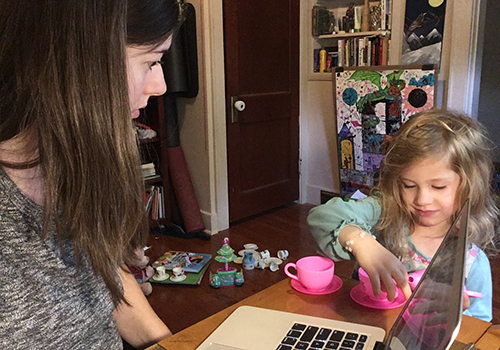
That Wednesday was the hottest day I had experienced thus far during my semester in Sevilla, Spain. Sunny and 80 degrees. I gave a midterm exam to my poetry students, met my husband and four-year-old twins for lunch, and we all spent the afternoon enjoying the park and a playground. At night, I read my kids their bedtime stories and fell asleep all cozied up next to them.
I was still asleep when President Trump announced the travel ban. Perhaps I was dreaming of the churros con chocolate we’d planned to eat at La Centuria in the morning. But when I woke and checked my phone, I was stunned by an urgent message left by my program coordinator back home in Illinois: my family and I had 48 hours to get out of Spain and back to the U.S.
Our Whirlwind Journey
Just like that, my semester teaching abroad at the International College of Seville was over. My husband and I tried to keep from panicking as we frantically packed and negotiated last-minute flight changes. We ended up having to take all of our belongings and our kids to the airport to try to secure our tickets home, face-to-face at the customer service desk. The exorbitant prices of last-minute tickets would have completely maxed out our credit cards, but luckily my home institution Heartland Community College assured me they would cover the cost—and that I was to do whatever it took to get home.
We got on a flight to Madrid the following night, attempted to sleep during our 12-hour overnight layover at the Madrid airport, then got on a 10-hour flight to Chicago. Soon we were collapsing into our own beds in East Peoria.
One would imagine that—after all the stress of last-minute travel, the panic induced by spending time in airports and airplanes during an unfolding pandemic, the four-hour wait in the customs and health check line at O’Hare, and the exhaustion of keeping two four-year-olds entertained through it all—I would be relieved to be at home. One would imagine that everything would be easier once we were finally in our own country, in our own city, in our own house.
But it wasn’t.
It wasn’t easier. The pandemic followed us home. Of course there was a difficult transition period: unpacking, laundry, laundry, laundry, the discombobulating feeling like we were walking in a dream as we adjusted to being back in our home, and the obstacles in getting our pantry stocked while stuck in our post-travel quarantine. But the difficulties didn’t end once we’d figured all that out—and not because our 14-day quarantine turned into a months-long “shelter in place.” The real issue was that I was still supposed to be teaching classes from home, where I was now spending 24/7 with my husband and children.
Let me say that I am aware of the real privilege I am experiencing. I am not in fear of losing my job, my income or my home. My job is one that transforms into a work-from-home situation fairly seamlessly. And, I am not in a position where I also have to help older children with assignments who are at home from school. My preschool-aged children are not at a high risk for falling behind in their education. I’m also not a single parent; I have a husband, the father of my children, who can also share the load. And yet, working from home has created daily obstacles in my life.

Delicate Balance of Attention
Because I usually work outside of the house, my kids assume I can give them my full attention when I am home. They don’t understand that even though I’m here (and pretty much living in lounge pants), I actually still have work to do. It doesn’t matter that their father is also available—if my kids had it their way, all four of us would spend every minute of every day together. In fact, it seems like they have become even more clingy since we’ve been sheltering at home. It’s hard to keep seeing yourself as a college professor when your kids need you as a mom all day.
And yet, teachers have always struggled with work-life balance. Most teachers have to bring at least some work home—lesson planning and grading—so I was already familiar with the push and pull of finding time to do that work around our family schedule. But now that I’m home all the time, it’s much harder to strike the balance. I’m glad to be here with my kids and husband, but I also thrive when I feel validated by doing good teaching. So, do I record more videos, respond to emails or troubleshoot with students via Zoom, and grade more assignments? Or do I make another mermaid necklace, play another round of Candy Land or Operation, pretend to be terrified of the giant toy bug the kids are chasing me with, or read them another book as we snuggle up on the couch?
Having this opportunity to share quality time with my children is wonderful, and often tempting—but children were not meant to be raised without a village. As much as I love being with them, I identify as an introvert and I really do need alone time to recharge. Not only that, but I have the expectation of continued work to mar these precious moments with the guilt that I’m not doing more. But just how am I supposed to get to that work when my kids want my attention every waking minute? In my experience, here are my choices:
- I can hand the kids over to my husband, which works for 20 minutes until they realize I’m not playing with them too, and they search the house screaming “MAMA” to come find me;
- I can work very late at night or very early in the morning when the kids are sleeping;
- I can attempt to get the kids involved in some kind of project, and then spend every few minutes of my work time responding to or redirecting them; or
- I can sit them in front of a screen and let them watch several episodes or movies in a row.
I’ve seen assurances all over social media that parents shouldn’t feel too badly about increased screen time for their kids. We’re in crisis mode, they say. It’s not forever, they say. We used to watch lots of television as kids, and we turned out alright, they say. And yet, screaming in the back of my mind are all the articles and books I’ve read about just how detrimental screen time can be for children’s developing minds! No matter how much I try to tell myself that it’s alright, I’m constantly worried that time in front of the screen is just addling their brains.
So, my husband and I try to find other activities for the kids to do: playing outside (I admit I’ve made some pandemic purchases toward better play equipment for our yard), planting our vegetable garden, coloring, playing music in my husband’s studio, board games and reading books. But the activity that provides the least amount of risk that the kids will interrupt my work is screen time. By far.
Given all of that, I am trying my best to limit the amount of time I need to work while still providing quality content for my students. And I’m trying to give myself grace about the fact that my kids are here in my space and they will interrupt me—even when my husband and I have done everything we can to keep them occupied. I’ve written assignment prompts at the breakfast table, graded essays with a child on my lap, and been somewhat successful recording teaching videos. At least if the kids barge into the room and interrupt, I can edit that out. But live conversations and meetings are a different story.

Learning to Let Go
One day during a Zoom call with a student, my kids were supposed to be indulging in some screen time. But every few minutes, one or both of them would come in and try to see what I was doing, show my student the toy they were playing with, or threaten to pull down the tapestry I’d expertly hung behind me to hide the messy state of my home. At least it wasn’t as bad as the time my son tried to cut my hair during a conference call...
Even finding the time to write this article has been difficult—I’ve written it in spurts. A few hundred words while the kids were in the bath, another few while they were building a block tower. Composing a paragraph in my head and praying for the time to sit and type it out later. Sitting the kids in front of a movie when I was afraid I’d lose my thoughts entirely. Thanking the gods for editors to make sure it all makes sense.
And while just finding the time to do the work is difficult, the other piece of the work-from-home puzzle is finding the motivation. The world is a scary place. I’m sad for myself and my family that we didn’t get to finish the semester in Spain, and I miss the classroom. The chemistry in the classroom is such a motivating factor for teachers and for students. I know it’s hard for everyone to keep their heads up as we attempt to finish coursework separated from each other in our own homes.
Yes, working from home has meant that I’ve lost my entire routine and schedule. Much of my work revolves around when my caretaker role allows for it. And it looks like this difficulty won’t end for me anytime soon. My summer course will be online, and there are rumors the fall semester might be, too. At worst, I’ll continue to struggle and feel guilty leveraging my work against time spent with my kids. But at best?
My best hope is that I’ll learn something from all this: about my own values and priorities and about letting go of things I can’t control. After all, I couldn’t control the spread of COVID-19 or the fact that I had to leave Spain and come home, but I can control how I react to all of it. And, I can hope to persevere to the other side of it. PM
- Log in to post comments

